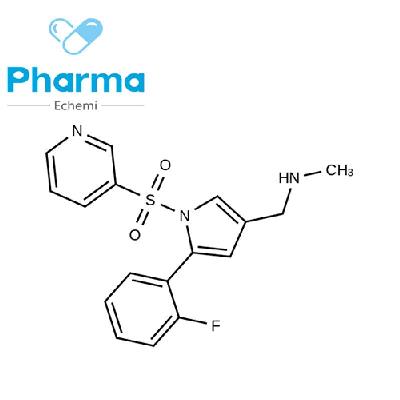-
Categories
-
Pharmaceutical Intermediates
-
Active Pharmaceutical Ingredients
-
Food Additives
- Industrial Coatings
- Agrochemicals
- Dyes and Pigments
- Surfactant
- Flavors and Fragrances
- Chemical Reagents
- Catalyst and Auxiliary
- Natural Products
- Inorganic Chemistry
-
Organic Chemistry
-
Biochemical Engineering
- Analytical Chemistry
-
Cosmetic Ingredient
- Water Treatment Chemical
-
Pharmaceutical Intermediates
Promotion
ECHEMI Mall
Wholesale
Weekly Price
Exhibition
News
-
Trade Service
Inflammatory bowel disease (IBD) is a class of nonspecific intestinal inflammatory diseases of unknown etiology, including ulcerative colitis (UC) and Crohn's disease (CD).
The clinical manifestations of such diseases are complex, accompanied by multiple complications, long course and easy recurrence, which can easily lead to delayed diagnosis and difficult treatment, which seriously affects the quality of life of patients1
.
With the continuous development of disease management strategies, how to improve the diagnosis and treatment level of IBD and standardize the treatment of biologics to improve the long-term prognosis of patients is currently a hot concern
of gastroenterology clinicians and patients.
Recently, we are honored to invite Professor Chen Baili of the First Affiliated Hospital of Sun Yat-sen University to conduct an exclusive interview, focusing on the hot topics in the field of diagnosis and treatment of IBD, from the perspective of real-world research (RWS) exploration and practice, in order to share academic insights for the majority of gastroenterologists and help improve the level of diagnosis and treatment of related diseases and clinical research of clinical frontline personnel
.
Expert profile
: Prof.
Baili Chen
- Chief physician
of the Department of Gastroenterology, The First Affiliated Hospital of Sun Yat-sen University Deputy leader of the Inflammatory Bowel Disease Group of the Gastroenterology Branch of Guangdong Medical Association
Member of the Psychological Collaboration Group of the Inflammatory Bowel Disease Group of the Gastroenterology Branch of the Chinese Medical Association
Member of the Capsule Endoscopy Collaborative Group of the Digestive Endoscopy Branch of the Chinese Medical Association
Deputy leader of the Youth Academic Group of the Chinese Journal of Inflammatory Bowel Diseases
Member of the Standing Committee of the Inflammatory Bowel Disease Professional Committee of the Chinese Medical Education Association
Member of Gastroenterologist Branch of Guangdong Medical Association
Prof.
Baili Chen: Randomized controlled studies (RCTs) are generally considered to be the gold standard for evaluating the safety and efficacy of drugs, and are commonly used in clinical research of drugs2
.
However, RCTs still have some limitations, such as small sample size, high research costs, insufficient representation of research subjects, and timely monitoring of adverse drug reactions
.
RWS refers to research
in which research data comes from a real medical environment and reflects the actual diagnosis and treatment process and the health status of patients under real conditions.
Since the issuance of China's first RWS guideline "China Real-World Research Guidelines 2018 Edition" in 2018 and the issuance and implementation of the "Technical Guidelines for the Use of Real-World Data for Clinical Evaluation of Medical Devices (Trial)" in 2020, the value of RWS has been valued and recognized by the state and gradually entered people's vision
.
Compared with RCTs, RWS includes a more representative group of clinically real patients, with a large sample size, wide coverage of the population.
At the same time, the long research period in the real clinical environment can provide more evidence for the efficacy and safety of drugs, and the analysis of different subgroups can help to find the advantageous population for drug treatment, but there are also problems such as
data bias and lack of efficacy indicators.
RWS is a new opportunity for drug trials, but because RWS is still in its infancy in China, it still faces the following challenges: first, lack of experience and insufficient understanding of RWS; Secondly, different research centers, data collection and content are different, data cannot be integrated and used; Finally, the research data had copyright issues and lacked integrity
.
At present, real-world research is mainly prospective research and retrospective research, due to the limitation of database integrity and accuracy, there are still many challenges in the research, and we look forward to the gradual improvement of our future scientific research tools to provide RWS with higher quality data
.
Prof.
Baili Chen: Long-term clinical remission and endoscopic remission are the goals of CD3
.
With the increase in the variety of biologics, evidence of efficacy and safety related to real-world research continues to accumulate, providing more reference information
for clinical decision-making.
A retrospective study by the US VICTORY Alliance confirmed that vedecrolizumab (VDZ) has higher rates of clinical response and mucosal healing in patients with moderate CD compared with anti-tumor necrosis factor (TNF)-α drugs4
.
VDZ has been applied in clinical practice in China, bringing new hope
for the treatment of UC and CD patients.
For patients with UC, especially those with moderate UC, VDZ induction therapy and maintenance therapy have significant effects, especially the mucosal healing rate, survival rate, and long-term use failure rate in maintenance therapy are very ideal
.
According to the current research data, the efficacy of VDZ in the treatment of patients with moderate CD is acceptable, but there are concerns about whether it can be applied to patients with severe or complicated CD
.
The WERY Alliance study data gives clinicians certain confidence and dosing evidence
.
There are three reasons for the discrepancy between the results of the analysis and the results of domestic and foreign studies: 1 It is premature
to assess the endpoint of efficacy.
Foreign retrospective studies evaluated the efficacy for 12 months or 24 months, which was relatively long
.
However, the multi-center phase 3 clinical study in China is short of 10 weeks, so there is a difference between the mucosal healing rate and clinical response rate between the two patients, suggesting that the clinical evaluation endpoint time should be moved
back.
2.
Whether intensive treatment
is required.
3.
Whether there are population differences, Asians may not be as effective as Caucasians
.
The results of real-world research provide guidance for clinical practice, on the one hand, RWS has a large sample size and can be analyzed in layers, and the research results can provide a basis for adjusting treatment plans in clinical practice.
Prospective studies have shown that first-line treatment with VDZ is advantageous in bio-naïve patients and those in the early stages of the disease.
On the other hand, the safety of medication, most foreign RWS results show that VDZ has fewer overall adverse reactions, which is preferred for special groups such as children, the elderly, pregnant women, and tumor patients
.
Q3: Which types of CD patients are the dominant group for VDZ?
Professor Baili Chen: As an enteric selective anti-lymphocyte migration (GSALT) biologic, VDZ can precisely target the intestine, prevent the migration of T lymphocytes from the blood vessels to the intestinal mucosa, and reduce the local inflammatory response of the intestine5
.
The results of EVOLVE study showed that VDZ had a higher two-year clinical response rate and mucosal healing rate than TNF-α inhibitors in first-line treatment of bio-naïve IBD patients, and had a better safety profile
.
It can be seen that patients with CD who have not been treated with biologics can benefit significantly from first-line treatment with VDZ
.
In addition, VDZ has a low missed response rate and can be used as long-term maintenance therapy
.
Due to the high intestinal selectivity and good safety factor of VDZ, it has little
effect on patients with tumor and tuberculosis infection.
Therefore, patients with tumors, tuberculosis, and risk of infection can also be used as an advantageous population
for treatment with VDZ.
In addition, VDZ has an advantage
in treating CD patients with colonic lesions.
More research is needed to discuss
whether VDZ is beneficial in treating patients with CD with gastrointestinal bleeding as the primary symptom.
Previous studies have proved that VDZ is safer than TNF-α inhibitors, and it is hoped that more RWS can be used to explore and answer whether the use of VDZ treatment in elderly CD patients is beneficial
in the future.
Professor Chen Baili: RWS has a large sample size, and the research is grouped based on patients' wishes or clinical actual choices, and usually does not intervene
in clinical diagnosis and treatment.
However, due to the late start of RWS in China, the ability to cultivate the research design of RWS urgently needs to be strengthened, and the rigor of researchers also needs to be strengthened
.
Secondly, due to the lack of uniformity in the database, there are problems such as under-negatives and misstatements, and there are also some reporting personnel who cannot standardize the records, if you need to obtain a representative real-world research, you should improve scientific research tools, do a good job in scientific design schemes, and seek high-quality research data
through reasonable statistical analysis.
In addition, economic issues cannot be ignored
.
These are some of the points
to note when conducting future RWS studies.
In the future, it is hoped that the majority of colleagues will actively carry out relevant research, summarize relevant experience, and share it to promote the standardization of RWS in China
.
brief summary
Professor Baili Chen interpreted the development of RWS in the field of IBD and clinical related issues
.
RWS provides an intuitive, definitive, evidence-based basis
for IBD clinical practice.
As an important treatment for IBD, biologics have shown good safety and significant efficacy
in clinical trials and clinical practice.
Based on the characteristics of patients' diseases, starting biologics as soon as possible can help IBD patients maximize benefits, and expect more real-world data to provide valuable references
for clinical applications.
References
1.
Liang Jie, Zhou He, Yang Hong, et al Consensus opinion on the multidisciplinary team diagnosis and treatment model of inflammatory bowel disease[J].
Chinese Journal of Inflammatory Bowel Diseases, 2021, 05(4): E002-E002
2.
Guidelines for Real-World Evidence to Support Drug Development and Review (Trial).
3.
Yoon H, et al.
Inflamm Bowel Dis.
2021; 27(8):1277-1284.
4.
Bohm M, Xu R, Zhang Y, et al.
Aliment Pharmacol Ther.
2020; 52(4):669-681.
5.
D Soler, et al.
J Pharmacol Exp Ther.
2009; 330(3):864-75.
6.
Bressler B, et al.
J Crohns Colitis.
2021 Mar 31:jjab058.
Approval number: VV-MEDMAT-79425
Approval date: January 2023
Disclaimer: This information is intended to help healthcare professionals better understand the latest developments
in these diseases.
The content of the information released by this platform does not mean that it agrees with its description and views, and only provides more information
.
If copyright issues are involved, please contact us and we will deal with
it as soon as possible.
The information provided in this information is not in any way a substitute for professional medical guidance and should not be construed as medical advice
.
If such information is used for purposes other than information, the Platform, the author, and Takeda shall not be liable
for such information.







